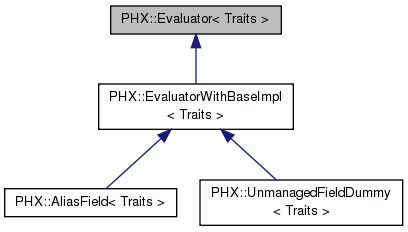|
Phalanx
Development
|
#include <Phalanx_Evaluator.hpp>

Public Types | |
| typedef PHX::Device | execution_space |
Public Member Functions | |
| Evaluator () | |
| Ctor. | |
| virtual | ~Evaluator () |
| Dtor. | |
| virtual void | postRegistrationSetup (typename Traits::SetupData d, PHX::FieldManager< Traits > &vm)=0 |
| Allows providers to grab pointers to data arrays. More... | |
|
virtual const std::vector < Teuchos::RCP< FieldTag > > & | evaluatedFields () const =0 |
| Returns vector of fields that this object evaluates. | |
|
virtual const std::vector < Teuchos::RCP< FieldTag > > & | contributedFields () const =0 |
| Returns vector of fields that contribute partially to the evaluation of a field. This allows users to spread the evaluation of a field over multiple evaluators. | |
|
virtual const std::vector < Teuchos::RCP< FieldTag > > & | dependentFields () const =0 |
| Returns vector of fields needed to compute the evaluated fields. | |
|
virtual const std::vector < Teuchos::RCP< FieldTag > > & | unsharedFields () const =0 |
| Returns vector of fields that are not allowed to share memory with other fields. | |
| virtual void | evaluateFields (typename Traits::EvalData d)=0 |
| Evaluate all fields that the provider supplies. More... | |
| virtual void | preEvaluate (typename Traits::PreEvalData d)=0 |
| This routine is called before each residual/Jacobian fill. More... | |
| virtual void | postEvaluate (typename Traits::PostEvalData d)=0 |
| This routine is called after each residual/Jacobian fill. More... | |
| virtual const std::string & | getName () const =0 |
| Returns the name/identifier of this provider. | |
| virtual void | bindField (const PHX::FieldTag &ft, const std::any &f)=0 |
| Binds memory to a field. WARNING: this is a POWER-USER function. Only use this if you understand the memory binding sequence (see detailed description for more information). More... | |
Device DAG Methods | |
Methods required for optional Device DAG cpability. The Device DAG capability allows for the entire DAG to be evaluated on device from a single kernel launch with a Kokkos::parallel_for. This capability requires that evaluators implement a stripped down PHX::DeviceEvaluator inside the standard evaluator that is suitable for constructing and executing on all device architectures of interest. | |
|
virtual PHX::DeviceEvaluator < Traits > * | createDeviceEvaluator () const =0 |
| Returns a DeviceEvaluator object instantiated on the Device using malloc and placement new so that vtable works properly. Only used for Device DAG support. | |
| virtual void | rebuildDeviceEvaluator (PHX::DeviceEvaluator< Traits > *e) const =0 |
| Call dtor and then call placement new on the memory to rebind data. Needed to rebind unmanaged fields that are set after DeviceEvaluator is constructed in postRegistrationSetup(). Only used for Device DAG support. | |
| virtual void | deleteDeviceEvaluator (PHX::DeviceEvaluator< Traits > *e) const =0 |
| Call dtor and delete device memory. Only used for Device DAG support. | |
| virtual void | printFieldValues (std::ostream &os) const =0 |
| Print the field values for all fields in the evaluator. | |
Pure virtual base class that provides field evaluation routines to the FieldManager.
|
pure virtual |
Binds memory to a field. WARNING: this is a POWER-USER function. Only use this if you understand the memory binding sequence (see detailed description for more information).
WARNING: This is a power user function. It sets/swaps the field memory for the supplied field (either an externally defined user managed field or an internally managed from the FieldManager). All evaluators that evaluate or depend on this field should be bound to the same memory. Otherwise you will get undefined results. To use this consistently, do not call this directly. Instead, bind all memory through calls to the PHX::FieldManager class.
Implemented in PHX::EvaluatorWithBaseImpl< Traits >.
|
pure virtual |
Evaluate all fields that the provider supplies.
Input:
| d | - user defined data object defined by the EvalData typedef in the traits class. |
Implemented in PHX::EvaluatorWithBaseImpl< Traits >, PHX::AliasField< EvalT, Traits >, and PHX::UnmanagedFieldDummy< EvalT, Traits, FieldT >.
|
pure virtual |
This routine is called after each residual/Jacobian fill.
This routine is called ONCE on the provider after the fill loop over cells is completed. This allows us to evaluate any post fill data. An example is to print out some statistics such as the maximum grid peclet number in a cell.
Implemented in PHX::EvaluatorWithBaseImpl< Traits >.
|
pure virtual |
Allows providers to grab pointers to data arrays.
Called once all providers are registered with the manager.
Once the field manager has allocated all data arrays, this method passes the field manager to the providers to allow each provider to grab and store pointers to the field data arrays. Grabbing the data arrays from the variable manager during an actual call to evaluateFields call is too slow due to the map lookup and FieldTag comparison (which uses a string compare). So lookups on field data are only allowed during this setup phase.
Implemented in PHX::EvaluatorWithBaseImpl< Traits >, and PHX::AliasField< EvalT, Traits >.
|
pure virtual |
This routine is called before each residual/Jacobian fill.
This routine is called ONCE on the provider before the fill loop over cells is started. This allows us to reset global objects between each fill. An example is to reset a provider that monitors the maximum grid peclet number in a cell. This call would zero out the maximum for a new fill.
Implemented in PHX::EvaluatorWithBaseImpl< Traits >.
 1.8.5
1.8.5